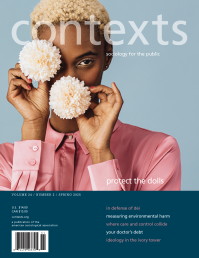
We own it
This is the Editors’ note for the Spring 2017 issue, posted here before print.
Hypatia, a feminist philosophy journal, is making a buzz right now in the humanities and social sciences. In its most recent issue it published an article titled, “In Defense of Transracialism” by Rebecca Tuvel, an assistant professor at Rhodes College in Memphis. This article takes off from Rachel Dolezal’s experiences and asks whether transracialism, like being transgender, is a legitimate concept. (Her answer: Yes, although race and gender are very different.) Coincidentally, we have an interview in this issue with Rachel Dolezal. (We’ll come back to that.)
The conceptual legitimacy of the category of transracial, especially in comparison to transgender, has been hotly debated. (Rogers Brubaker has a whole book on this called Trans, reviewed in this issue by Ivan Szelenyi.) But that’s not what we want to talk about right now. We want to talk about the responsibility of editors.
Quickly after Tuvel’s article came out, a petition circulated addressed to the journal’s editor and “the broader Hypatia community,” signed by a few hundred academics, requesting retraction of the article as its “continued availability causes further harm, as does an initial [Facebook] post by the journal admitting only that the article sparks dialogue.’” (The post seems to have been taken down.)
An associate editor at Hypatia then posted an apology on her Facebook page and reposted it on the journal’s Facebook page. The post, which was authored by “A Majority of the Hypatia’s Board of Associate Editors” (who don’t name themselves), apologized for the “harms that have ensued from the publication of this article.” It further states that, “Clearly, the article should not have been published” even though it had been through the journal’s standard peer-review process. They then called for a complete overhaul of their peer-review process. (Jesse Singal over at New York Magazine has a thorough dissection of the article and response, including how misdirected much of the criticism of Tuvel’s article in the petition and elsewhere are, in his piece, “This Is What a Modern-Day Witch Hunt Looks Like.”)
We were really bothered that Hypatia’s editor, Sally J. Scholz, took nearly a week to say anything about Tuvel publicly. Academic editors are used to working in slow motion, but In social media time that’s an eternity. Right before we published this article, The Chronicle of Higher Education published a piece that included a statement from Scholz where she says, “This is where I stand. Professor Tuvel’s paper went through the peer review process and was accepted by the reviewers and me.” Her statement of support is not as much a statement of support of Tuvel as it is a statement of the fact of publishing. Still, better than nothing.
But oy.
In this issue of Contexts, Ann Morning, a respected African American sociology of race scholar, did an interview for us with Rachel Dolezal. It was a very interesting, thoughtful interview, which we posted online at the end of March. It sparked a conversation—heated, at times thoughtful, mostly vitriolic. This was mainly on Twitter, so hot and bothered is what you’d expect. (And no, we did not pay top dollar, or any dollar, for this interview. And no, the American Sociological Association, while it is our publisher, is not involved with content and had no role in this.)
Contexts as a magazine, we as editors, and Ann Morning took a lot of flak for our publishing this interview. Why did we publish it? Dolezal, like her or not, has a fascinating story, and Morning did a great job interviewing her. Are there reasons to be critical? Of course there are—there always are. So go ahead and criticize, we can take it. We are firmly in the camp that it’s better to publish stuff that sparks a conversation than to not. Haters will hate (cool), but the constructive criticizers help to make our science better. Isn’t that what we signed up for? Criticizers could pitch us an article idea—arguably a better use of time than a Twitter rant tweetstorm.* No one actually did this yet, though.
Everything that goes into Contexts (and we should think pretty much every publication, and certainly academic publications) has been approved by the editors (us) whether it is peer-reviewed or not. Unless there’s fraud, you stand behind the authors and their work you publish. Like we did with Ann Morning’s interview with Rachel Dolezal. If you can’t do that, you should resign.
(* A twitterer pointed out that “Twitter rant” was kind of obnoxious and belittling. They were right.)

Comments 1
Daniel Sabbagh
May 8, 2017Hell yeah!